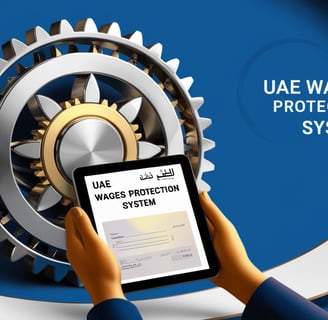Understanding the UAE's Wage Protection System: Safeguarding Employee Rights and Ensuring Fair Payments
Demystifying Wage Protection for International Schools in the UAE: Addressing Key Issues
HR SOFTWARE PROVIDERS WAGE PROTECTION SYSTEM
Alan Clark
8/22/20244 min read


The United Arab Emirates (UAE) has implemented the Wage Protection System (WPS) as a critical measure to ensure the prompt and accurate disbursement of employees' wages. This comprehensive electronic system was established with the primary goal of safeguarding the rights of employees by ensuring timely wage payments. The WPS mandates that all salaries be processed through an authorized network of banking and financial institutions, thereby promoting wage transparency and reducing the likelihood of payment-related disputes.
The origins of the WPS can be traced back to the UAE's commitment to upholding fair labor practices. The regulatory authorities recognized the need for a more transparent and reliable method to disburse wages, particularly in a rapidly growing economy where labor dynamics are continually evolving. By introducing the WPS, authorities aimed to enhance wage protection mechanisms and provide a credible solution to common wage payment issues faced by employees. This initiative reflects the UAE’s dedication to ensuring compliance with labor laws and protecting worker rights.
The purpose of the WPS extends beyond merely streamlining wage payments. It also plays a pivotal role in fostering a fair and equitable working environment. By requiring employers to adhere to a standardized payment process, the system mitigates the risk of unjust payment practices and ensures that employees are compensated accurately and on time. This system also benefits employers, as it facilitates adherence to labor laws and regulations, thereby reducing legal risks associated with wage disputes.
Moreover, the WPS enhances wage transparency, a crucial factor in promoting trust and cooperation within the workforce. Employees are assured of receiving their full wages through legally recognized channels, which not only secures their financial rights but also contributes to overall job satisfaction. In essence, the WPS is a vital tool for achieving wage fairness and protecting employee rights in the UAE's dynamic labor market.
Key Objectives and Benefits of the WPS
The Wage Protection System (WPS) in the United Arab Emirates is designed to uphold a fair labor market by ensuring both employee welfare and employer interests are safeguarded. One of the primary objectives of the WPS is to secure employee salaries by guaranteeing timely and accurate payments. This is achieved through an electronic system that regulates and monitors wage disbursement, providing employees with peace of mind regarding their earnings. The assurance of reliable and punctual payments is a cornerstone in fostering a stable and motivated workforce, enhancing job security and satisfaction.
For employers, the WPS addresses critical concerns by reducing the risk of legal disputes and non-compliance penalties. By adhering to the WPS regulations, employers can avoid fines and legal repercussions associated with delayed or missed salary payments. This not only protects their financial standing but also reinforces their commitment to fair labor practices. Furthermore, the system's emphasis on transparency and regulatory compliance helps build a trustworthy relationship between employers and employees, fostering a more cooperative and productive working environment.
Additionally, the WPS offers significant time and resource savings by automating the salary processing functions that were traditionally managed manually. Employers can streamline payroll operations, reducing administrative workload and minimizing the potential for errors. The automation provided by the WPS ensures that salaries are calculated and distributed correctly, supporting the overall efficiency and accuracy of payment processes.
The structured wage payment framework established by the WPS enhances job security for employees. The consistent and monitored nature of the system mitigates the uncertainty often associated with wage discrepancies and delays. Employees can rely on the system for fair and consistent remuneration, which serves as a foundation for a more stable and contented workforce. In light of these objectives and benefits, the Wage Protection System plays a crucial role in shaping a transparent and equitable labor market in the UAE.
How the WPS Works: A Step-by-Step Guide
The Wage Protection System (WPS) in the UAE is an essential measure designed to ensure timely and fair payment of wages to employees, embedding a sense of security and reliability within the labor market. Understanding the mechanics of WPS is indispensable for both employers and employees, providing transparency and promoting trust within the employment relationship.
Firstly, employers are required to open bank accounts for their employees with financial institutions that are registered with the WPS. Once these accounts are set up, employers must submit payroll data to the Ministry of Human Resources and Emiratisation (MoHRE) through specified channels. This payroll data must include detailed information, such as salary amounts, payment dates, and the employees' bank details.
Upon receipt of the payroll data, MoHRE cross-references the information to ensure it aligns with the wage agreements stipulated in employment contracts. The verified payroll file is then forwarded to the respective financial institutions. These institutions, acting as an intermediary, process the salaries and disburse them directly into the employees' bank accounts. This streamlined process not only facilitates timely payments but also provides a legal framework that safeguards employee rights.
To comply with WPS regulations, employers must adhere to several key steps:
- Ensure all employees have valid bank accounts with WPS-registered financial institutions.
- Regularly submit accurate payroll data to MoHRE.
- Resolve any discrepancies or objections raised by MoHRE or the financial institutions promptly.
Monitoring mechanisms are robust under the WPS, with regular audits conducted by MoHRE to ensure compliance. Employers are also mandated to keep detailed records of wage payments and report any deviations promptly. Non-compliance can lead to severe penalties, including fines, suspension of business licenses, and restrictions on obtaining new work permits.
Despite its effectiveness, the implementation of the WPS can present challenges. Common issues include errors in payroll data submission, delays in wage processing due to administrative errors, and difficulties faced by employers in understanding regulatory requirements. To navigate these challenges, employers are advised to undergo regular training, seek professional consultancy, and maintain open lines of communication with financial institutions and regulatory bodies.
By comprehending and adhering to the WPS procedures, both employers and employees can benefit from a system that not only fosters financial transparency but also strengthens the integrity of the labor market in the UAE.
